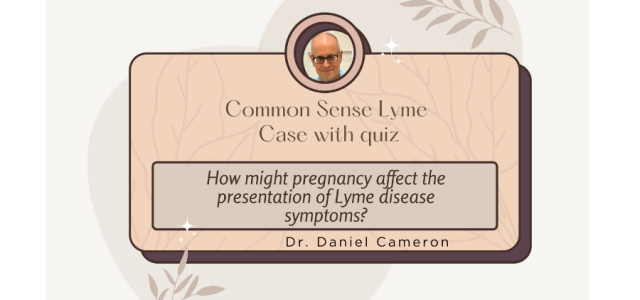Lyme Science Blog
Dr. Daniel Cameron, MD, MPH, is a nationally recognized leader for his expertise in the diagnosis and treatment of Lyme disease and other tick-borne illnesses. His weekly Lyme Disease Science blog features articles covering the latest research, insights and case reviews.
Lyme Science Blog
Who Are Ticks Attracted To?
It’s a warm day, you’ve been hiking, gardening, or walking the dog—and later that evening, you find a tick. Sound
Lyme Science Blog
What if a patient with Guillain-Barré doesn’t have an autoimmune issue – but Lyme disease?
In a letter to the editor published in the Annals of Indian Academy of Neurology, Varma SY and colleagues¹ describe
AI, Lyme Science Blog
Babesia Treatment Protocol: When Lyme Therapy Fails
A babesia treatment protocol is frequently the missing piece for patients who remain ill after Lyme disease therapy. When this
AI, Lyme Science Blog
When Lyme Treatment Fails: Could It Be Babesia?
When lyme treatment babesia goes unrecognized, patients stay sick. Babesia is increasingly recognized as a serious and sometimes overlooked tick-borne
Lyme Science Blog
Can You Get Lyme Disease Without a Tick Bite?
Can You Get Lyme Disease Without a Tick Bite? Yes, it’s possible to have Lyme disease without ever recalling a
Lyme Science Blog
A Common-Sense Approach to the Dosage of Antibiotics for Lyme Disease
When treating Lyme disease, a common challenge is not just choosing the right antibiotic—but making sure a patient can tolerate
AI, Lyme Science Blog
Babesia Blood Transfusion: How One Unit Changed Everything
Babesia blood transfusion transmission is more common than most people realize. When we think of tick-borne illnesses like Babesia, we
Lyme Science Blog
Lyme Disease with Weakness and Hyporeflexia
This case involved a 25-year-old woman who experienced progressive numbness and tingling, beginning in her torso and eventually affecting her
Lyme Science Blog
Can Lyme disease stay hidden during pregnancy and only emerge after childbirth?
A 23-year-old woman from Brooklyn, NY, presented to her primary care physician with bilateral knee swelling and pain three days









